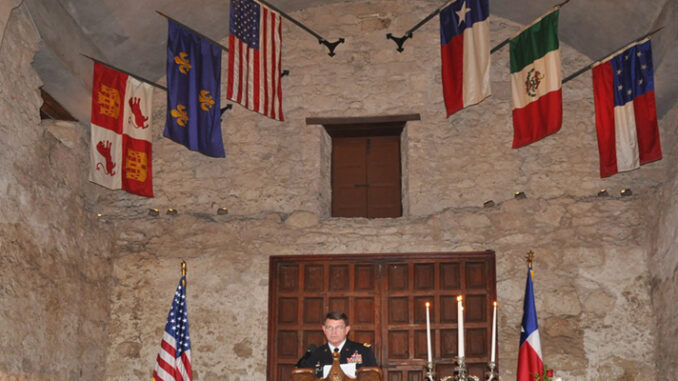
Texas 1836 Project presents history as propaganda rather than critical inquiry or a full accounting of the past.
by Raúl A. Ramos
Like my sons, I sat through two years of Texas history in both the fourth and seventh grades. It seems Texas legislators believe that isn’t enough, so they have crafted House Bill 2497 to “promote patriotic education and increase awareness of the Texas values that continue to stimulate boundless prosperity across this state.” It’s called the Texas 1836 Project.
If calling this the Texas 1836 Project sounds familiar, it is because it comes as a direct response to the New York Times’ 1619 Project. Published two years ago, the 1619 Project proposes a new timeline for American history centered on slavery in order to understand the roots of racism. It has also become the object of legislation such as HB 3979, which would limit its usage in social studies curriculum.
The Texas 1836 Project bill differs from its legislative cousin by dictating an official history of Texas by establishing a committee appointed by the governor, lieutenant governor and House speaker that would advise state agencies to ensure patriotic education at state parks, monuments, museums and elsewhere. Modeled after the 1776 Commission, one of Donald Trump’s final orders as president, the 1836 Project rings hollow and insincere by asking us to forget or silence what we already know.
Legislators know Texas history is complicated and multiethnic and say as much in the bill. The bill incorporates Juneteenth, the celebration of the end of slavery in Texas in 1865, as an event worthy of study. The bill was revised to include the influence of Indigenous peoples as well as Spanish and Mexican descendant Tejanos.
These inclusive gestures, though, amount to empty window-dressing. Taken as a whole, the Texas 1836 Project seeks to erase injustice and conquest in the past by mandating “patriotic education.” The project wants to focus on “the history of prosperity and democratic freedom in this state.” Like the Hollywood Western film sets to which it aspires, the Texas 1836 Project is a facade that obscures the enormous cost and impact of the American frontier myth.
History teachers must be able to have their students ask difficult questions about slavery and the dispossession of Indigenous and Tejano land. Forcing that history through a filter of “prosperity” and “democratic freedom” doesn’t make sense. How does requiring a “patriotic education” standard square with the lynching of Black and ethnic Mexican Texans? The values and leaders of the 1836 war that separated Texas from Mexico didn’t result in emancipation and Juneteenth, they actively sought to protect slavery in perpetuity.
But sound, accurate history isn’t the stated goal of the legislation. Beyond the advisory committee and a Gubernatorial 1836 Award to recognize student knowledge of Texas Independence, the only tangible requirement in the bill is a pamphlet for the Department of Public Safety. Along with Texas history, the pamphlet is to include “the legacy of economic prosperity in this state; and the abundant opportunities for businesses and families in this state.” It presents history as propaganda rather than critical inquiry or a full accounting of the past.
This government mandated history reminds us how easy it is to rally around a single, victorious story. The American experiment tells us that reality is much harder — that it takes work to build a framework that is inclusive of both pride and pain, or injustice and freedom for all to feel they belong. That story needs a shared process, and not a committee of nine politically appointed members in today’s hyper-partisan climate.
With the focus on 1836, this bill repeats and reinforces the myth that Texas history only begins with American immigration. Indigenous and Tejano peoples only appear as pre-history or background to the main event. Tejanos return merely as immigrants in their homeland. The driving force of slavery and its political and social power conveniently fade away under the power of William Travis’ call for “victory or death.” For Black Texans, though, there would be no victory until 1865.
I’ve been teaching Texas history to college students for 17 years, and they don’t want a rehash of the second and seventh grade Texas curriculum. Today’s young people see Texas not as isolated and idiosyncratic, but as a dynamic and evolving place. Rightly so. Texas is the crossroads of indigenous empires, Spanish frontier projects and restless American ambitions.
The anxiety with the 1619 Project among a generation of Americans accustomed to a triumphalist, uncontested timeline is understandable. At the heart of these bills concerned with history is the belief discussing the flaws of our founders undermines the possibility of progress. Historians will point out that moving forward requires seeing the wrong paths in order to find a better way. The choice, however, is not between patriotic pride and anti-racist shame. A deeper engagement with history can be had for Texas but not by retreating to stale myths and exclusionary stories.
The Texas 1836 Project is set up to teach the wrong lessons from the past and divide our communities — precisely at a time when we need to see all Texans as human beings rooted in history and makers of our shared future.
Raúl Ramos is an associate professor of history at the University of Houston and recipient of the T.R. Fehrenbach Book Award for “Beyond the Alamo: Forging Mexican Ethnicity in San Antonio, 1821-1861.”



